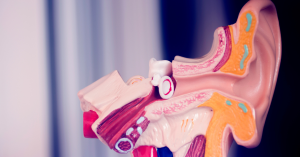Tinnitus — that persistent ringing, buzzing, or hissing in your ears — can feel like a relentless intruder in the quiet moments of your life. Whether it’s mild or overwhelming, occasional or constant, millions of people worldwide are asking the same urgent question: how to tune out tinnitus once and for all?
The truth is, while there’s no one-size-fits-all cure, there’s a wide range of powerful, science-backed techniques that can significantly reduce or even silence the symptoms. From neurological retraining methods to natural lifestyle tweaks, the path to peace is possible — and closer than you think.
In this article, we’ll dive deep into what causes tinnitus, how the brain processes sound, and most importantly, how you can retrain your mind and body to diminish its grip on your daily life. If you’ve felt frustrated, hopeless, or overwhelmed by the noise in your head, you’re not alone — and you’re certainly not powerless.
Understanding Tinnitus and Its Root Causes
Tinnitus isn’t just a mysterious ringing in the ears—it’s a symptom that can arise from a variety of underlying conditions, both physical and neurological. To understand how to tune out tinnitus effectively, we first need to explore what’s actually causing the sound and how the brain processes it. Only then can we begin to reframe the experience and apply strategies that lead to lasting relief.
What is Tinnitus and Why Does it Happen?
At its core, tinnitus is the perception of sound without any external source. For some, it sounds like a high-pitched whine; for others, it’s a constant buzzing, clicking, or even a whooshing sound. While it may feel like it originates from the ears, research shows that the brain plays a central role.
Common causes of tinnitus include:
- Hearing loss (especially age-related or noise-induced)
- Ear infections or earwax blockages
- Exposure to loud noise (like concerts or machinery)
- Head or neck injuries
- Medications (such as aspirin, antibiotics, or diuretics)
- Chronic conditions like Meniere’s disease or high blood pressure
When the auditory system is damaged or altered, the brain compensates by increasing activity in auditory regions. This creates the phantom noise that defines tinnitus. Essentially, the brain is trying to “fill in” the silence, resulting in a sound that doesn’t actually exist in the external environment.
The Science Behind Brain Noise
Tinnitus isn’t just an ear issue—it’s a neuro-auditory phenomenon. Functional MRI scans and brain mapping have shown that individuals with chronic tinnitus often have hyperactivity in the auditory cortex. Over time, this “brain noise” becomes more deeply embedded through neural pathways, especially if it’s tied to stress, anxiety, or emotional responses.
The limbic system, which controls emotions and behavior, also plays a key role. That’s why people under stress often report their tinnitus worsening—it’s not just louder; it’s more distressing. In fact, the emotional reaction to the noise can be more damaging than the noise itself.
Understanding this is empowering. It means that with the right neurological and psychological interventions, it’s absolutely possible to decrease the brain’s attention to tinnitus and rewire how it’s perceived. Tinnitus isn’t always about volume—it’s about awareness and reaction.
Neurological Strategies to Rewire Your Brain
If you’ve ever felt like you’re stuck with tinnitus forever, here’s the good news: your brain is incredibly adaptable. Thanks to neuroplasticity—the brain’s ability to reorganize itself—you can train your mind to reduce the perception of tinnitus over time. While the sound may not disappear completely, these techniques can help you push it into the background until it no longer controls your life.
Cognitive Behavioral Therapy (CBT) for Tinnitus
One of the most effective, clinically supported methods for managing tinnitus is Cognitive Behavioral Therapy (CBT). Originally developed to treat depression and anxiety, CBT helps people shift their mental response to the ringing sound, reducing its emotional and psychological impact.
CBT doesn’t change the sound itself, but it transforms how your brain responds to it. Here’s how it helps:
- Reframes negative thinking: Instead of catastrophizing (“This ringing will drive me crazy”), CBT helps you develop healthier, more realistic thoughts (“This is just a sound—I can handle it”).
- Reduces anxiety and stress: These are major tinnitus triggers. By calming your mind, you reduce your body’s fight-or-flight response, which helps lower the volume of perceived tinnitus.
- Improves sleep and focus: CBT teaches relaxation techniques and habits that promote restful sleep—vital for those suffering from tinnitus-related insomnia.
Studies published in journals like JAMA Otolaryngology and The Lancet confirm that CBT provides significant relief to tinnitus patients. Many report not only reduced distress but a complete shift in how they relate to the noise.
Sound Therapy and Habituation
Another brain-based approach is sound therapy, which introduces external noise to help your brain tune out the internal one. By listening to neutral sounds—like white noise, nature sounds, or soft music—you create a less noticeable contrast between the tinnitus and your environment.
This promotes habituation, a process where your brain starts to treat tinnitus like background noise, just like the hum of a fridge or the ticking of a clock.
Sound therapy can be done through:
- White noise machines placed in bedrooms or workspaces
- Tinnitus-masking hearing aids that amplify external sound while covering up internal noise
- Personalized soundscapes through mobile apps or digital platforms
The brain eventually learns to ignore the tinnitus sound as it focuses on the more neutral ones, similar to how we tune out the feeling of our clothes or the distant buzz of city life. It takes time and consistency, but with regular use, sound therapy can lead to dramatic reductions in tinnitus awareness.
Natural and Lifestyle-Based Relief Techniques
While medical and therapeutic approaches are powerful tools, your everyday lifestyle habits can play a huge role in managing tinnitus. Many people underestimate how nutrition, exercise, sleep, and mental wellness directly influence the brain’s ability to tune out unwanted noise. In this section, we’ll explore how natural methods create a calmer mind and a healthier auditory system — all without medication.
Diet, Exercise, and Sleep for Brain Reset
Tinnitus is often amplified when the body is out of balance. Your diet, physical health, and sleep quality can all impact how your brain processes sound.
Diet: Feed Your Brain, Calm the Ringing
There’s no one “tinnitus diet,” but some foods and nutrients support neurological health and circulation, which can ease symptoms:
- Magnesium-rich foods (spinach, avocados, dark chocolate) may reduce tinnitus intensity.
- Omega-3 fatty acids (found in fatty fish like salmon) support brain function and may counter inflammation.
- Vitamin B12 deficiencies are commonly linked to tinnitus—especially in older adults. Eggs, dairy, and fortified cereals can help.
- Hydration is crucial! Dehydration can spike tinnitus symptoms.
Avoid excessive caffeine, salt, and alcohol, as these can trigger episodes in sensitive individuals.
Exercise: Move to Mute the Noise
Exercise boosts blood circulation to your ears and brain, which can help flush out toxins, reduce stress, and promote healthier auditory function. Even 20–30 minutes a day of walking, yoga, or cycling can:
- Decrease anxiety and cortisol (which spike tinnitus perception)
- Improve sleep quality
- Elevate mood and overall brain chemistry
Sleep: The Silent Healer
Tinnitus tends to feel louder at night when the world is quiet. Poor sleep can intensify your emotional reaction to the noise, creating a vicious cycle. Good sleep hygiene tips include:
- Stick to a consistent bedtime
- Avoid screens an hour before sleep
- Use white noise machines or calming apps to mask ringing
- Try melatonin or natural herbal teas (like chamomile) to wind down
By giving your body the right tools to heal and reset, you reduce the internal tension that often fuels tinnitus.
Mindfulness, Meditation, and Stress Control
Mindfulness isn’t just about “sitting still and breathing”—it’s a scientifically validated technique to change how the brain processes pain and intrusive thoughts, including tinnitus.
Meditation: Retrain Your Focus
Studies have shown that regular mindfulness meditation reduces activity in the default mode network—the brain’s “daydreaming” state, where people tend to ruminate. This can help:
- Shift your attention away from the ringing
- Build resilience to distressing sounds
- Lower emotional arousal tied to tinnitus
Apps like Headspace, Calm, and Insight Timer offer guided meditations specifically for tinnitus sufferers.
Stress Management: A Game-Changer
Stress is often the #1 amplifier of tinnitus. It tightens muscles, raises blood pressure, and makes your auditory system hyper-sensitive. Proven stress reducers include:
- Deep breathing exercises
- Journaling and expressive writing
- Acupuncture and massage
- Spending time in nature
The more you build calm into your life, the more likely your brain is to downgrade tinnitus to background noise.
Technological Tools and Tinnitus Treatments
In our modern era, technology is not just a convenience — it’s a therapeutic ally. When it comes to managing tinnitus, a range of innovative tools and treatments can help retrain your auditory system, reduce perception of ringing, and improve your quality of life. Let’s explore how tech meets therapy in the battle against tinnitus.
Hearing Aids and Masking Devices
Tinnitus and hearing loss often go hand in hand. In fact, about 80% of people with tinnitus also have some degree of hearing impairment — and that’s where hearing aids come in.
Hearing Aids: Amplify the World, Diminish the Ringing
Modern hearing aids don’t just amplify sound — they balance out the frequencies your ears struggle with. By enhancing external sounds, the internal ringing becomes less noticeable. Here’s how they help:
- Reduce the contrast between silence and tinnitus
- Improve communication and reduce listening fatigue
- Lessen the brain’s need to “fill in the silence”
Some hearing aids even come with built-in tinnitus maskers — these emit a soothing sound like ocean waves or white noise to cover up the ringing.
Tinnitus Maskers and Wearables
For those who don’t need a hearing aid, standalone masking devices are another effective solution. These small, discreet gadgets produce a constant, calming sound that helps your brain ignore the tinnitus. Popular styles include:
- In-ear devices (like earbuds with white noise)
- Wearable sound generators
- Neckband-style speakers for continuous ambient audio
Many users report that with regular use, the brain learns to disregard the tinnitus signal, creating long-term relief.
Mobile Apps and White Noise Machines
Tech-savvy solutions are now right at your fingertips — literally. Mobile apps and dedicated machines offer customizable sound environments to help with focus, sleep, or relaxation.
Best Tinnitus Apps for Relief
There’s a growing number of apps specifically designed for tinnitus relief. These include:
- ReSound Relief – Offers sound therapy, meditation, and guided relaxation
- Tinnitus Balance – Developed by hearing aid companies, integrates with Bluetooth devices
- myNoise – Customizable ambient soundscapes for focus and sleep
- Calm and Headspace – While not tinnitus-specific, their mindfulness features are gold for stress-related flare-ups
Most apps allow you to blend multiple sounds, schedule sleep timers, or integrate with wireless earbuds or hearing devices for day and night use.
White Noise Machines
These machines create a consistent sonic backdrop, which helps mask tinnitus—especially in quiet settings like bedrooms. Look for models that feature:
- Nature sounds (rain, wind, birds)
- Pink or brown noise (softer than white noise)
- Adaptive volume settings
They’re especially helpful for those who struggle with tinnitus-induced insomnia. Some even sync with your smartphone to track sleep patterns or trigger calming sounds during wake-ups.
Living with Tinnitus: Real-Life Coping Strategies
Even with all the right tools and therapies, there’s no denying that living with tinnitus is a journey. The ringing may not vanish overnight, but what can change is how much control it has over your day. This section is all about everyday habits, emotional resilience, and lifestyle tweaks that make the noise more manageable — and your life much more peaceful.
Building a Daily Routine That Minimizes Symptoms
Routine might sound boring, but for tinnitus sufferers, structure equals control. When your days are chaotic or unpredictable, your stress levels can spike — and with them, your tinnitus.
Here’s how to create a tinnitus-friendly daily rhythm:
- Morning: Begin with light stretching, deep breathing, or even a short meditation to ground yourself.
- Throughout the day: Use tinnitus management tools (apps, background music, soft ambient noise) during work or quiet times.
- Hydration breaks: Dehydration can worsen symptoms — keep a bottle nearby and sip often.
- Evening wind-down: Avoid stimulants like caffeine or screens late at night. Use calming sounds or relaxation techniques to prepare your mind for restful sleep.
Consistency helps your brain associate these routines with calmness, which lessens tinnitus intrusion over time.
Psychological Resilience and Support Systems
The emotional toll of tinnitus can’t be overstated. Some people experience anxiety, panic, even depression as they struggle with a sound they can’t escape. But here’s the truth: you don’t have to face it alone, and you’re stronger than you think.
Join a Support Group
Whether online or in-person, connecting with others who “get it” is powerful. Support groups offer:
- Emotional validation
- Shared success stories and coping ideas
- A sense of belonging when tinnitus makes you feel isolated
Look into forums like Tinnitus Talk, Facebook groups, or local audiologist-run meetups.
Work with a Therapist
Beyond CBT, general therapy can help with the frustration and anxiety that often accompany tinnitus. A licensed counselor or psychologist can guide you in developing:
- Coping statements (“This is temporary. I can handle this.”)
- Gratitude practices to shift your mental focus
- Acceptance strategies — instead of resisting the sound, you learn to allow it without panic
❤️ Lean on Friends and Family
Let loved ones know what you’re dealing with. They may not fully understand, but they can offer support by helping with stress reduction, providing quiet companionship, or simply listening.
By building a circle of calm and understanding, your mind has more room to breathe — and less need to fixate on tinnitus.
Conclusion: You Can Tune Out Tinnitus — One Step at a Time
Tinnitus may be persistent, but so is the human spirit. Whether your ringing is occasional or constant, mild or severe, know this: relief is possible, and you’re not alone in the fight.
By understanding the brain’s role in tinnitus, embracing neuroplasticity through CBT and sound therapy, improving your lifestyle habits, and using the latest tech tools — you can reduce the impact of tinnitus on your life. And most importantly, you can reclaim your peace.
It’s not always about silencing the sound. Sometimes, the victory lies in diminishing its power over you. With knowledge, support, and consistency, you can transform tinnitus from a daily struggle into a manageable background hum.
So take a deep breath, trust in the process, and know that tuning out tinnitus is not just a dream — it’s a destination you can reach.
FAQs About How to Tune Out Tinnitus
Can your brain really learn to ignore tinnitus?
Yes, through a process called habituation, your brain can gradually tune out the perception of tinnitus. Techniques like cognitive behavioral therapy (CBT), sound therapy, and mindfulness help retrain the brain to consider the ringing as non-threatening background noise, making it less noticeable over time.
What sounds are best for masking tinnitus?
Gentle, consistent sounds work best — such as white noise, nature sounds, pink noise, or soft instrumental music. The ideal sound should be soothing, not distracting, and can be customized using apps or white noise machines to match your environment and preferences.
Are there any vitamins or supplements that help with tinnitus?
Some people find relief using magnesium, vitamin B12, zinc, and ginkgo biloba, though results vary. Always consult a healthcare provider before taking supplements, especially if you’re managing other conditions or medications.
How long does it take to habituate to tinnitus?
It varies. Some people notice improvements within a few weeks, while others may take several months to a year. Consistency is key — regularly practicing stress reduction, using sound therapy, and following structured therapies like CBT can accelerate the process.
Can tinnitus get worse if left untreated?
Yes, without management, tinnitus can become more intrusive—especially if compounded by stress, poor sleep, hearing loss, or emotional distress. Early intervention with lifestyle changes or therapy often leads to better outcomes and improved quality of life.
Is it possible to completely cure tinnitus?
There’s currently no universal cure, but many people achieve long-term relief or complete habituation, where they no longer notice the sound. Advances in neuroscience, sound therapy, and mental health treatments offer hope for those living with persistent tinnitus.






